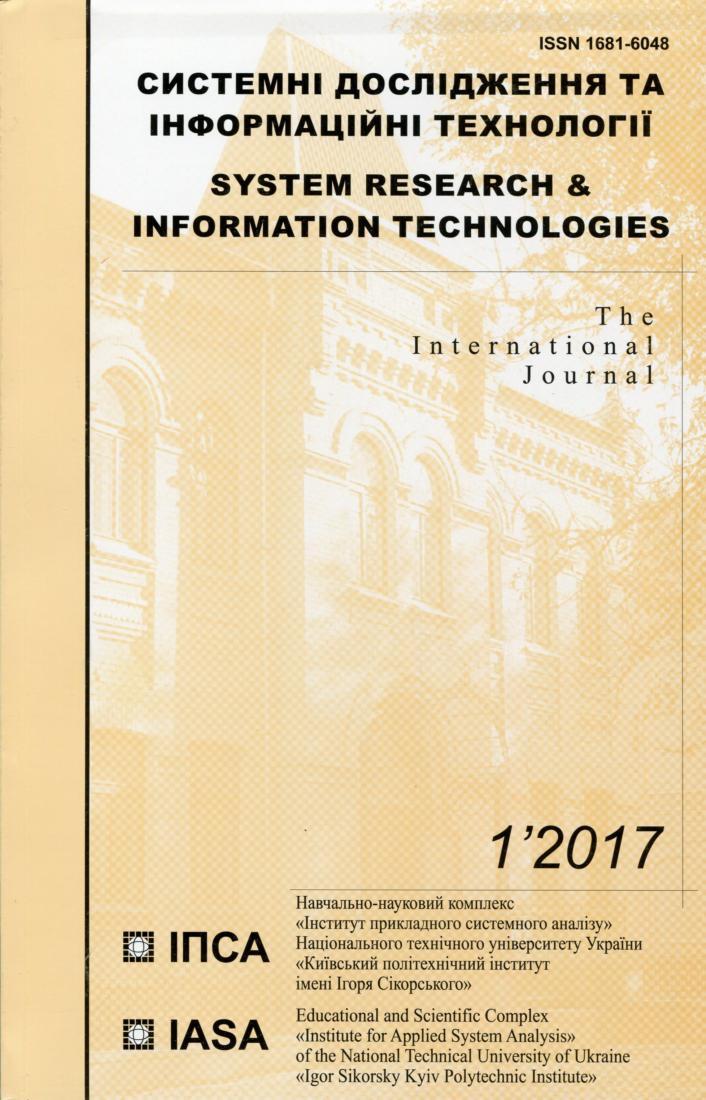Estimation of social dynamics and development prospects of knowledge society
DOI:
https://doi.org/10.20535/SRIT.2308-8893.2017.1.02Keywords:
knowledge, knowledge society, mathematical modeling, missing data, hierarchical modelAbstract
Research and modeling of the knowledge society is very important from the point of view of the country's transition to a new improved standard of living and economic, social and technological cooperation. In this article, the basic principles of the k-society modeling, problem of missing statistical data and methods to recover these data were considered. In addition, the model's component, the index of social dynamics and prospects of development, was analyzed in detail and constructed for 126 countries. Analysis of the results was presented for the current rating system and the dynamics for the past 10 years for 10 leading countries, 10 outsider countries, and Ukraine. This index correlates reasonably well with the index of economic measurement of sustainable development that demonstrates the feasibility and importance of research in this area which helps to create the development strategy by using k-society models.References
Zhurovs'kyj M.Z. Shljakh do suspil'stva, zasnovanoho na znannjakh / M.Z. Zhurovs'kyj // ZN.UA. — Available at: http://gazeta. dt.ua/EDUCATION/shlyah_do_ suspilstva,_zasnovanogo_na_znannyah.html
Human Development Index (HDI). — Avaliable at: http://hdr.undp.org/en/content/ human-development-index-hdi
Handbook on Constructing Composite Indicators. Methology and user guide // Organization for Economic Co-operation and Development. — Avaliable at: http://www.oecd.org/std/42495745.pdf
Ilchenko K. A Composite Indicator of K-society Measurement / K. Ilchenko, I. Pyshnograev // Proceedings of the 11th International Conference on ICT in Education, Research and Industrial Applications: Integration, Harmonization and Knowledge Transfer (ICTERI), May 14–16, 2015.
Understanding Knowledge Societies. In twenty questions and answers with the Index of Knowledge Societies. — New York: United Nations, 2005.
Monitoring informatsionnogo obschestva i obschestva znanij // Izdanie JuNESKO dlja vsemirnogo sammita po informatsionnnomu obschestvu. — SPb., 2004. — 126 s.
The world bank. Indicator: Foreign direct investment. — Avaliable at: http://data. worldbank.org/indicator/BN.KLT.DINV.CD/countries? display=map
The world bank. Indicator: Patent applications, residents. — Avaliable at: http://data.worldbank.org/indicator/IP.PAT.RESD
The world bank. Indicator: Research and development expenditure. — Avaliable at: http://data.worldbank.org/indicator/GB.XPD.RSDV. GD.ZS
The world bank. Doingbusiness. — Avaliable at: http://www.doingbusiness. org/reports/global-reports/
The Global Competitiveness Report 2015–2016. — Avaliable at: http://reports.weforum.org/global-competitiveness-report-2015-2016/
The world bank. Indicator: Government expenditure on education. — Avaliable at: http://data.worldbank.org/indicator/SE.XPD. TOTL.GD.ZS
The world bank. Indicator: Pupil-teacher ratio in primary education. — Avaliable at:http://data.worldbank.org/indicator/SE.PRM. ENRL.TC.ZS
The world bank. Indicator: Children out of school. — Avaliable at: http://data. worldbank.org/indicator/SE.PRM.UNER.ZS
Human Development Report. Education index. — Avaliable at: http://hdr.undp.org/ en/content/education-index
Vision of humanity. Global Peace Index. — Avaliable at: http://www. visionofhumanity.org/#page/indexes/global-peace-index/2016
Freedom house. About Freedom of the Press. — Avaliable at: https:// freedomhouse.org/report-types/freedom-press
The Failed States Index 2005. — Avaliable at: http://fsi.fundforpeace.org/rankings-2005-sortable
The world bank. Indicator: Proportion of seats held by women in national parliaments. — Avaliable at: http://data.worldbank.org/indicator/SG.GEN.PARL.ZS
World Economic Forum. Global Gender Gap Report. — Avaliable at: https://www. weforum.org/reports/global-gender-gap-report-2015/
Snytjuk V.E. Prognozirovanie. Modeli, Metody, Algoritmy: ucheb. posobie / V.E. Snytjuk. — K. 2008. — 367 s.
Horton N.J. Multiple Imputation in Practice: Comparison of Software Packages for Regression Models with Missing Variables / N.J. Horton, S.R. Lipsitz // The American Statistician. — 2001. — Vol. 55. — P. 244–254.
World Data Center for Geoinformatics and Sustainable Development. — Avaliable at: http://wdc.org.ua/en/data

